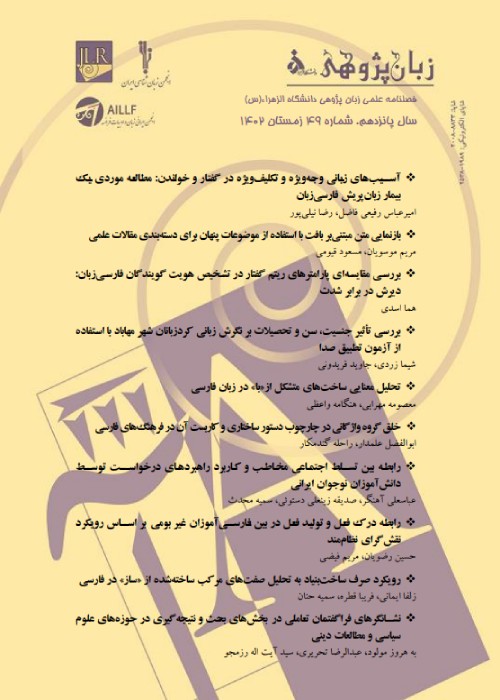The interaction of achievement verbs and grammatical aspect in Persian
Aspect refers to “different ways of viewing the internal temporal constituency of a situation” (Comrie, 1976, p.3) and consists of lexical and grammatical types. Grammatical aspect is represented by inflection or some auxiliary verbs while lexical aspect is denoted by the inherent meaning of the verbs (Rezai, 2012). The aspectual classification of Vedler (1957), has been one of the most influential theories in lexical aspect studies (Tenny, 1987, p.29; Peck et al., 2013, p. 664; Kanijo, 2019, p.73). Vendler (1957) has classified verbs into four classes named states, activities, achievements, and accomplishments based on their stativity, duration, and telicity. Achievements describe the change of state that occurs instantaneously and creates a new situation (Pavey, 2010, p.97), they have inherent endpoint and are usually regarded as not being used progressively. Two sub-classes of achievements are “culminations” and “happenings”. Culminations need some time to occur, for example, to “reach a summit”, we have to walk a distance. Happenings lack this preparatory phase and occur instantly, for example, “explode” occurs in a very short time. In previous studies, Persian verbs have been classified to two classes, “achievement” verbs that occur in a short time and have endpoint and “durative” verbs that entails some time to occur (Jahan Panah Tehrani, 1984). Vahidiyan Kamyar (1992) added the third class, named “achievement-durative” verbs that occur in a short time but don’t end and extend through time. Abolhassani (2011) has also classified achievements to three sub-classes. Other studies have mostly investigated lexical or grammatical aspect in Persian or in a specific dialect (Daneshpazhouh et al., 2013; Abasi, 2015, Dastlan, 2018). The main objective of this study is to describe different readings of Persian achievements along with grammatical aspects in the framework of Role and Reference Grammar (RRG). For this purpose, achievement verbs, in two subdivisions named “culminations” and “happenings”, were selected in different contexts and their readings were analyzed in different grammatical aspects. Data have been collected from different Persian sites on the Internet and daily conversations.
This paper studies the interaction of achievement predicates with grammatical aspects based on Role and Reference Grammar. RRG has proven to be a very practical framework for the description of aspectual classes. It proposes a linear and layered conception of syntactic organization without placing any underlying forms or movement rules and posits only one level of syntactic representation that is mapped directly into the semantic representation (Van Valin & Lapolla, 1997, p.21).The semantic structure in RRG provides a clear system of lexical decomposition that is an Aktionsart-based method of representing the semantics of predicates and their arguments (Van Valin & Lapolla, 1997, p.91). A predicate is identified as a member of a particular classification depending on some grammatical tests that have been established for English and other languages. The semantic representation is linked to the syntactic structure by means of an algorithm and the semantic roles of arguments are correlated with macroroles. In RRG a sentence is composed of at least one clause and clause of at least one core. Within the clause core are the nuclear predicating element and its arguments. Adverbs modifying the nucleus are not core elements but are placed in positions preceding or following the nucleus called peripheries. In Role and Reference Grammar (Van Valin & Lapolla, 1997, p.91-92), verbs are divided to four basic classes, including states, activities, achievements and accomplishments as proposed by Vendler (1957). Based on some specific-language tests, each of these classes are distinguished from each other. States are homogenous and involve no action and no final point. Activities, despite states, represent actions and have continuous feature. Achievements occur in a moment and don’t have continuous feature. Accomplishments are change of state verbs but occur in a longer time in comparison with achievements. Among these classes, achievements are change of state verbs; the beginning and end of these verbs are so short that can be neglected. They have final point and since they are considered durationless, they can't be used with adverbs such as "vigorously" and "seriously". Regarding the grammatical aspect, four main types can be distinguished; perfective, imperfective, perfect and prospective aspect. Perfective indicates a situation as a single whole, whereas the imperfective looks at the situation from inside and the focus is on the internal structure of the event (Smith, 1997, p.3). The perfect is retrospective which establishes a relation between an event at one time and a situation at an earlier time. In prospective aspect, the event is related to some subsequent situation, for example when some event is about to be done (Comrie, 1976, p.64). Based on this framework, different readings of Persian achievements are investigated in different grammatical aspects.Data have been selected from written and spoken resources, including web sites and daily conversations. As aspect is better specified in the context, each predicate has been considered in its actual use and the interaction of lexical and grammatical aspect has been identified.
The data show that the culmination and happening predicates in Persian can occur with perfective aspect; since these verbs involve the final point, the occurrence of them with perfective aspect shows that the verb has reached its end and has finished. As achievement predicates describe instantaneous changes from one state to another, the adage that achievements "lack progression" is well-known, but the presented data show that achievements in progressive forms can have five readings based on pragmatic context, including preliminary process reading, slow-motion (camera) reading, iterative reading, future progressive reading, and commentary reading (Gyarmathy, 2015). Culmination-achievements can occur on preliminary process reading that focus on the process before reaching the final phase of the verb. On slow-motion reading, an event described by the achievement predicate, which is regarded durationless, acts as a durative eventuality, that is, we "zoom in" to view it as an extended event. This reading is available to predicates which describe events that are not instantaneous, but take some small amount of time. The iterative reading is most natural with semelfactives. The future reading has prospective interpretation. The last reading or commentary reading, is available when the speaker is conveying the happenings to someone else; this reading is used when the exact timing of the utterance is not important. Achievement verbs in perfect aspect can represent some functions such as experiential, universal, hot news, and evidentiality. Achievement predicates in perfective, imperfective, and perfect aspect can represent some prospective interpretation depending on pragmatic context and existence of some temporal adverb denoting future time in the sentence.
Achievement verbs in perfective aspect denote change of states that occur instantaneously and reach its endpoint. In culmination verbs, reaching this endpoint entails some preparatory phase but in happening sub-class, this phase is not applied. Although achievements are regarded as lacking progressive, they can have five readings in imperfective aspect, depending on the context; they include preliminary process reading, slow-motion (camera) reading, iterative reading, future progressive reading, and commentary reading. Achievement verbs in perfect aspect can represent experiential, universal, evidentiality, and hot news functions. In prospective aspect, positive form of the sentence and some temporal adverbs are required to denote occurrence of the action in some future time.
- حق عضویت دریافتی صرف حمایت از نشریات عضو و نگهداری، تکمیل و توسعه مگیران میشود.
- پرداخت حق اشتراک و دانلود مقالات اجازه بازنشر آن در سایر رسانههای چاپی و دیجیتال را به کاربر نمیدهد.



